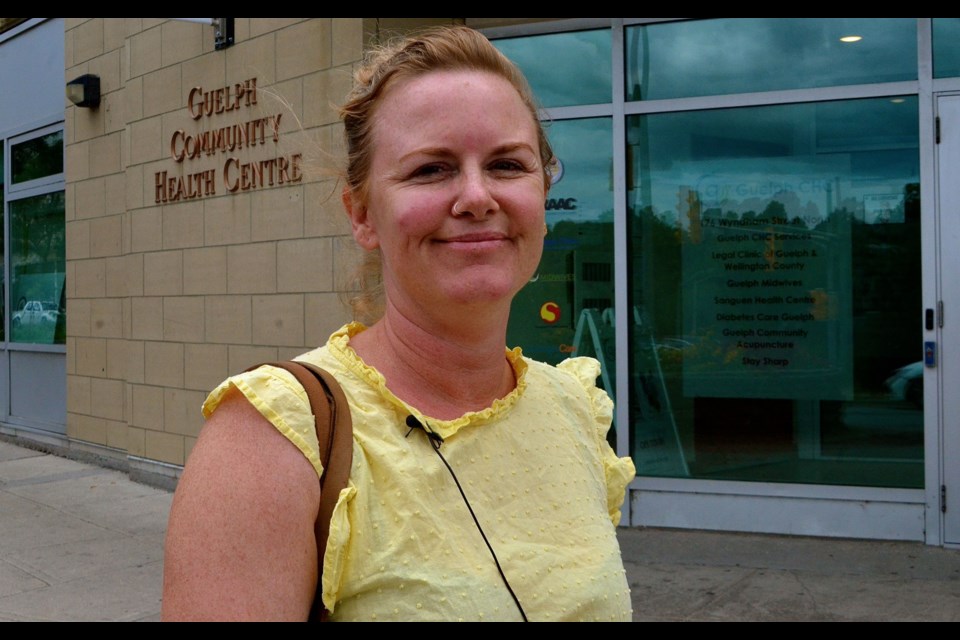Peer outreach worker Julie Porter had ambitions to be an award-winning journalist until she discovered she would rather do the things she was writing about.
“I went into journalism to be the next Christiane Amanpour,” she said. “I had high expectations and I also went into it because I really wanted to tell stories.”
She got that opportunity straight out of college when she landed a job at the Waterloo Region Record and was assigned to write for a series about social justice issues.
“I interviewed a whole bunch of men involved in the Community Justice Initiatives program,” said Porter. “I was so impressed by CJI and so interested in the work that I thought, instead of writing about this I wanted to try doing some of the work. I switched my focus and applied for a job at the AIDS Committee of Guelph as an educator. I got that job and that’s how I entered the field of work I am in now.”
Porter is a peer outreach worker for the Guelph Community Health Centre’s Downtown Guelph Welcoming Streets Initiative.
“The mandate of Welcoming Streets is to work in tandem with businesses and the street-involved population,” she said.
The initiative was launched last summer as a five-month pilot project and was extended in March 2019 as one of three initiatives identified by the Mayor’s Task Force on homelessness and community safety. This has allowed Porter and fellow outreach worker Rachel Vear to maintain and build relationships in the community.
“I try to have a presence downtown where people are and I build relationships slowly over time so, people get a sense of knowing who we are,” said Porter.
She draws on her own experiences to identify and empathise with the city’s most vulnerable
“I had a very traumatic experience happen in my late teens and I was lost to the world,” she said. “I remember how incredibly alienated and isolated, fearful, defeated and misunderstood I felt at that point in my life. So, I carry with me those memories when I work with people that I know are experiencing similar things within our system.”
Porter was born in Toronto in 1973 and raised by adoptive parents as their only child. Her interest in the arts led her on a cross-country scholastic journey.
“I have done a weird amount of school,” she said. “I started off at Yukon College in Whitehorse doing my first two years of an undergrad. Because I was a person who couldn’t sustain any kind of continuance in my life, I went to Newfoundland and I took a fine arts program.”
She completed her undergrad degree at Memorial University in St John’s and moved back to Ontario where she decided to study journalism at the Doon campus of Conestoga College.
“I completed the journalism program at Conestoga College and that is how I got involved in this work,” she said. “I was lucky enough to be hired by the AIDS Committee of Guelph, which is called ARCH and that sort of launched me on my way.”
She was with ARCH for a year and a half then worked for an outreach program in Kitchener called Between a Rock and a Hard Place.
“I was involved specifically with women involved in the sex trade,” said Porter. “I worked at that for a couple of years and at the same time I worked at a shelter in Kitchener called Mary’s Place. Then I worked at the Legal Clinic of Guelph and Wellington County as a community legal worker. Then I had kids and I took a long break from work.”
She has a 12-year-old son and a 10-year-old daughter and as they got older she felt the urge to return to work.
“I came back and was lucky to get hired at the Guelph Community Health Centre,” she said. “That was the best twist of fate.”
The Welcoming Street Initiative is funded by the City of Guelph, the County of Wellington, the United Way Guelph Wellington Dufferin, Downtown Guelph Business Association and the Guelph Police Services Board and was established to provide support, education and connections to services for individuals and businesses downtown.
“My main goal in this job is to create a feeling of literally more welcoming streets downtown where both the downtown business community and the vulnerable population downtown feel less alien from each other,” she said.
“There is a huge number of human beings we interact with daily, especially downtown who appear to have mental health conditions and people are immediately afraid of that. I want people to know that those people – the people walking around talking to themselves – are far more at risk of violence being enacted upon them than they are ever to perpetrate a violent crime.”
She believes that building relationships helps to reduce fear and stigma.
“Truly, I feel like we’re all one paycheque or one trauma away from living very differently from how we are living now,” she said. “So, that is what’s in my head when I am working with folks.”
She considers herself lucky to do this work.
“I just really like people and I like hearing their stories,” she said. “I really love the idea of working with the incredible collaborative team at the Guelph Community Health Centre but also with the intention to make the city I live in a more inhabitable place for everyone. That’s a great thing to be able to work on. I know it sounds Pollyanna-ish but it has been a delightful job to have.”
.png;w=120;h=80;mode=crop)

